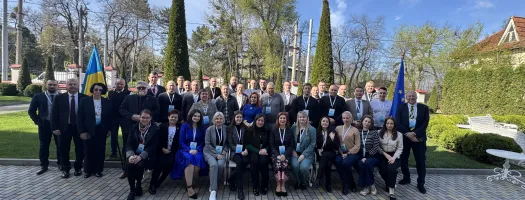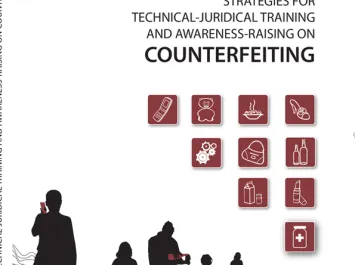A five-day training programme equips Ukraine’s justice and security actors to investigate and prosecute complex CBRN threats
Nuclear and radiological materials, chemical agents, and biological pathogens play vital roles in the medical, industrial, and research fields. However, in the wrong hands, these same substances can endanger lives, disrupt economies, and destabilize regions. Ukraine, a country with significant nuclear infrastructure and a volatile security environment due to the ongoing armed conflict, faces heightened risks of chemical, biological, radiological and nuclear (CBRN)-related crimes. Ensuring national preparedness to detect, investigate, and prosecute such threats is critical - not just for Ukraine’s security, but also for regional and global stability. Addressing these risks requires more than technical expertise; it demands strong legal frameworks and well-trained justice personnel capable of turning complex evidence into solid criminal cases.
European Union CBRN Centres of Excellence (EU CBRN CoE)-supported action to mitigate CBRN risks
From 7 to 11 April 2025, 32 professionals from across Ukraine’s security and justice sectors convened in Chișinău, Republic of Moldova, for a high-level training course designed to improve the investigation, prosecution, and adjudication of crimes involving CBRN materials. Hosted by the National Institute of Justice of Moldova and implemented by UNICRI under the EU-funded CBRN CoE Project, the course marked the third in a series of tailored capacity-building initiatives for Ukraine.
Drawing participants from diverse institutions - including prosecutors, investigators, judges, police, customs officers, and legal advisers - the course tackled challenges across the entire CBRN crime response chain. From securing contaminated crime scenes to handling nuclear forensic evidence, and from applying international legal standards to conducting cross-border investigations, participants explored how to effectively build and defend cases in court. The five-day programme culminated in advanced sessions on criminal charges and appeals processes, ensuring that prosecutions can be pursued through every legal avenue available.
One of the most compelling aspects of the training was its real-world applicability. Participants were guided through case studies from countries such as Iraq, Germany, Hungary, the United Kingdom, and the United States - each illustrating the very real dangers of CBRN misuse and the complex interplay of law enforcement, scientific expertise, and international cooperation needed to prosecute offenders. Practical scenarios addressed the integrity of evidence under hazardous conditions, chain-of-custody procedures, and the value of intelligence-sharing in early threat detection.
The training represents not just a knowledge exchange, but a long-term investment in Ukraine’s national resilience. Selected modules from the course will be integrated into the curricula of Ukrainian law enforcement and judicial training academies - ensuring that this expertise is not only retained but expanded across institutions. As Ukraine continues to face hybrid threats in a high-risk security landscape, such training builds both national readiness and regional confidence.
Centres of Excellence (CoE) Project background information:
This training is part of the pilot project “Strengthening the CBRN Investigation, Prosecution, and Adjudication (IPA) Capabilities of Ukraine,” delivered within the framework of the European Union (EU) CBRN Risk Mitigation Centres of Excellence (CoE) Initiative. The CoE Initiative - launched in 2010 and jointly implemented by the European Commission and the United Nations Interregional Crime and Justice Research Institute (UNICRI) - supports over 60 partner countries in developing the capacity to prevent, detect, and respond to CBRN risks.
The IPA pilot project reflects a decade-and-a-half of collaboration between the EU and Ukraine under the CoE umbrella. Through sustained support - including training, expert deployment, and the provision of specialized equipment - Ukraine has become one of the most active and engaged partners in the Eastern and Southeast Europe region. This latest milestone reinforces the country’s legal preparedness to address crimes involving hazardous substances and enhances its cooperation with neighbouring states on transnational CBRN risks.
The project is implemented with technical coordination by the Science and Technology Center in Ukraine (STCU), which ensures the smooth logistics and delivery of activities. With Moldova hosting the training and offering its facilities and institutional partnership, the initiative exemplifies regional solidarity in action.
To learn more about the EU CBRN CoE Initiative and its projects, please click here.



